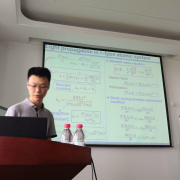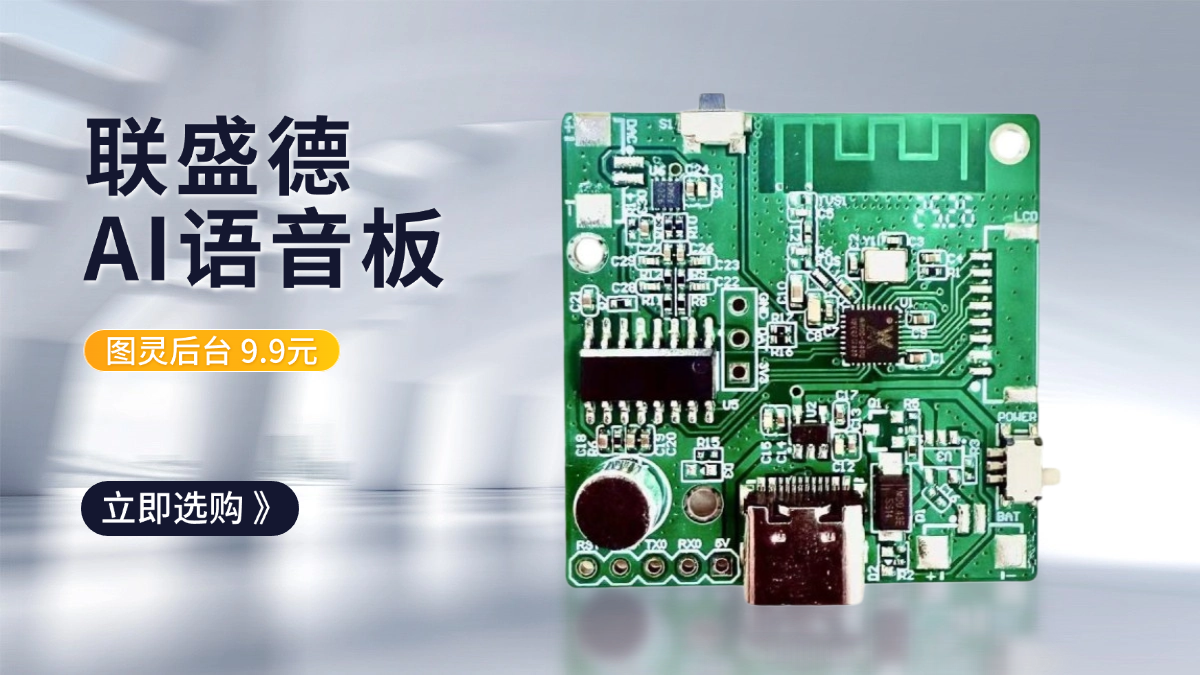联盛德 W803-Pico 试用 - TFT 图片显示
【联盛德 W803-Pico 试用】TFT 图片显示
本文介绍了联盛德 WM-IoT-SDK 2.X 工程结合 W803-Pico 板实现 TFT 屏幕驱动的项目设计,包括原理介绍、代码解析、效果展示等。
介绍
TFT 彩色液晶屏在日常生活和工作中十分常见且应用广泛,如便携式显示、车载显示、计算机显示(笔记本电脑、监视器)、家电和办公室显示(电视、互联网络终端)、手机、游戏机、医疗设备等。
因此了解和学习使用 TFT 显示屏一直是嵌入式开发中的热点话题,同时驱动 TFT 屏也是考验 MCU 综合性能的极佳指标和参照。
1.8 寸 TFT 彩屏模块
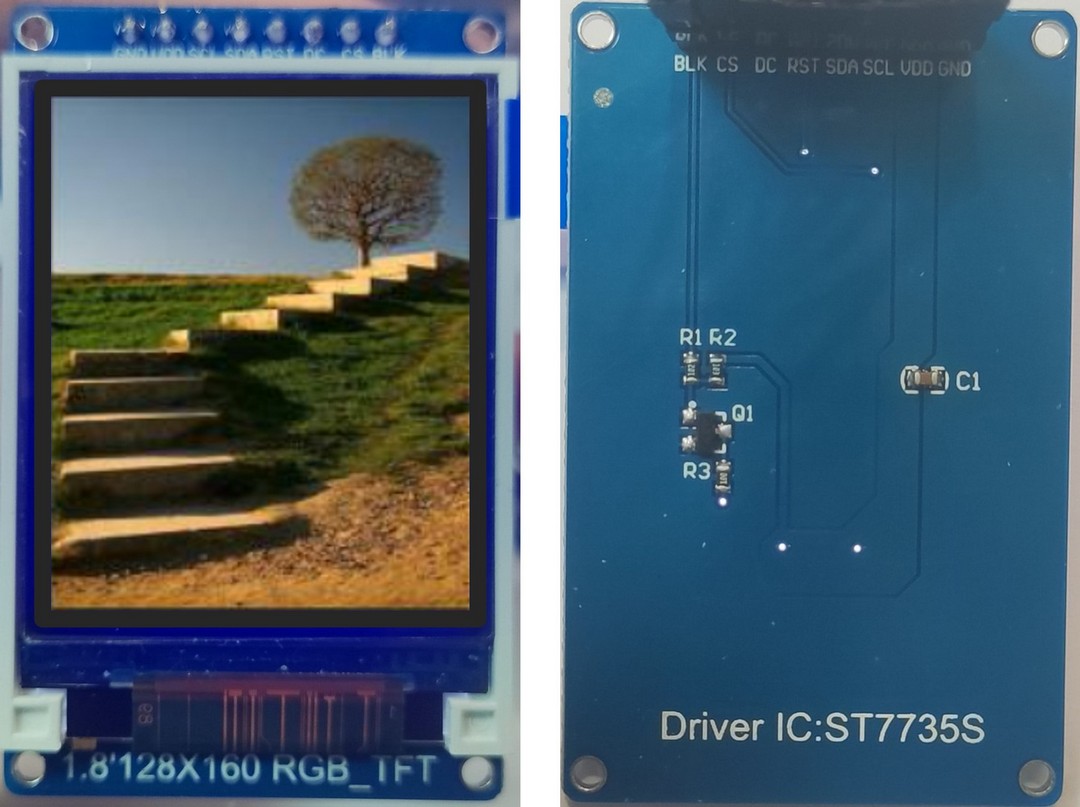
原理图
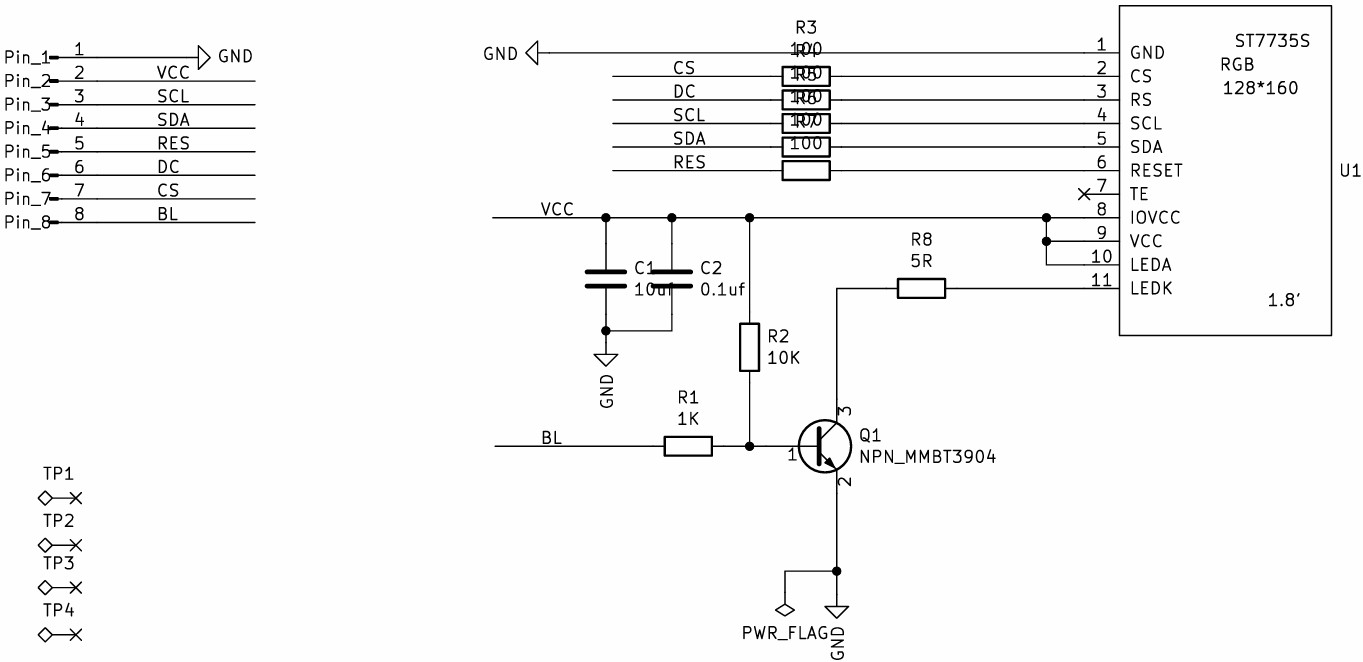
管脚定义
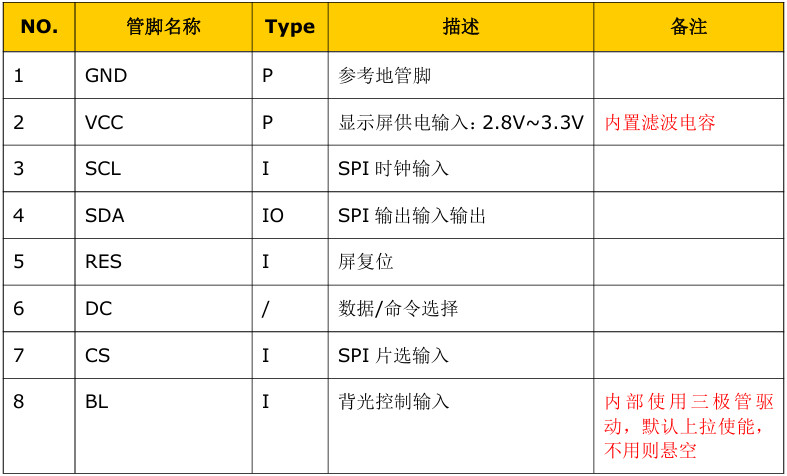
参数规格
- 型号:M_TFT_LCD_128X240_8P
- 输入电压:2.8V 至 3.3V
- 供电电流:>20mA
- 显示类型:1.8 inch TFT
- 显示色彩:262K
- 分辨率:128 x RGB x 240
- 视角:12 O'CLOCK
- 驱动 IC: ST7735S
- 接口类型:SPI
- 背光模式:并联 LED
- 背光驱动方式:PWM
- 结构类型:COG+DIP
- 显示区尺寸:35x28mm
- 外形尺寸:55 x 34.7 x 12 mm
- 工作温度:-20°C ~ 70°C
参考:TFT .
硬件连接
| GPIO序号 | 引脚编号 | TFT 引脚 |
|---|---|---|
| WM_GPIO_NUM_22 | PB6 | CLK (SCL) |
| WM_GPIO_NUM_23 | PB7 | MOSI (SDA) |
| WM_GPIO_NUM_27 | PB11 | CS |
| WM_GPIO_NUM_26 | PB10 | RESET |
| WM_GPIO_NUM_25 | PB9 | DC |
| WM_GPIO_NUM_24 | PB8 | BLK |
参考:TFT_LCD_DMA — WinnerMicro 在线文档
实物连线
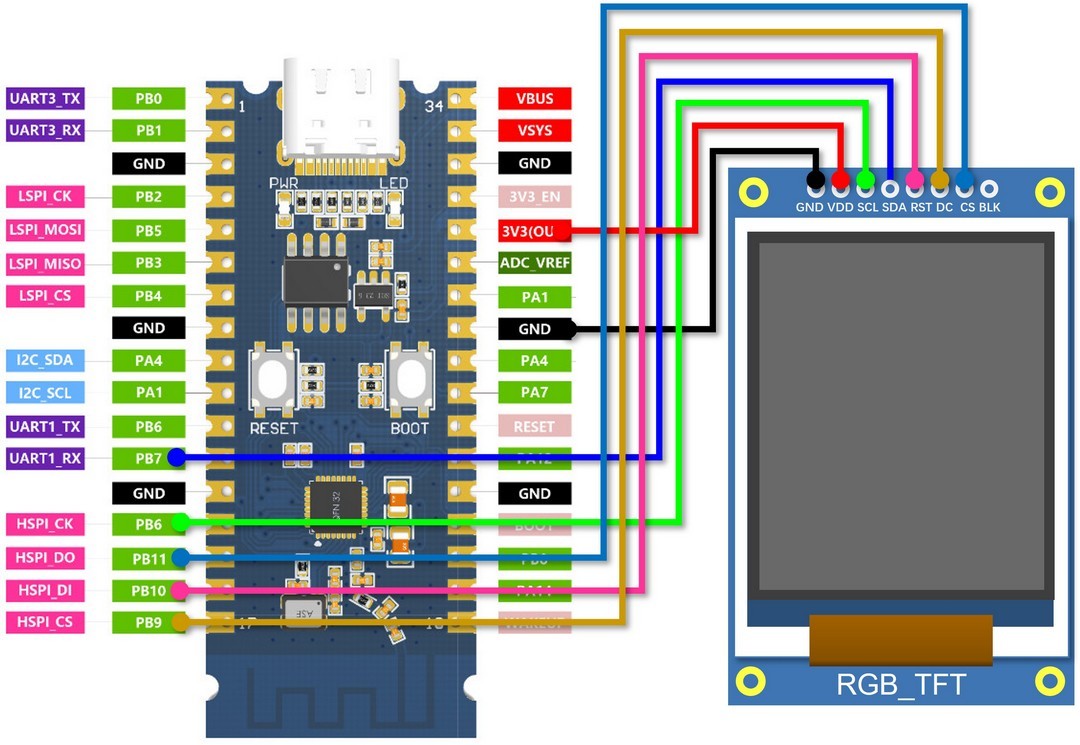
工程测试
介绍了 WM-IoT-SDK 2.X 实现 TFT 屏驱动显示的主要流程。
SDK 框图
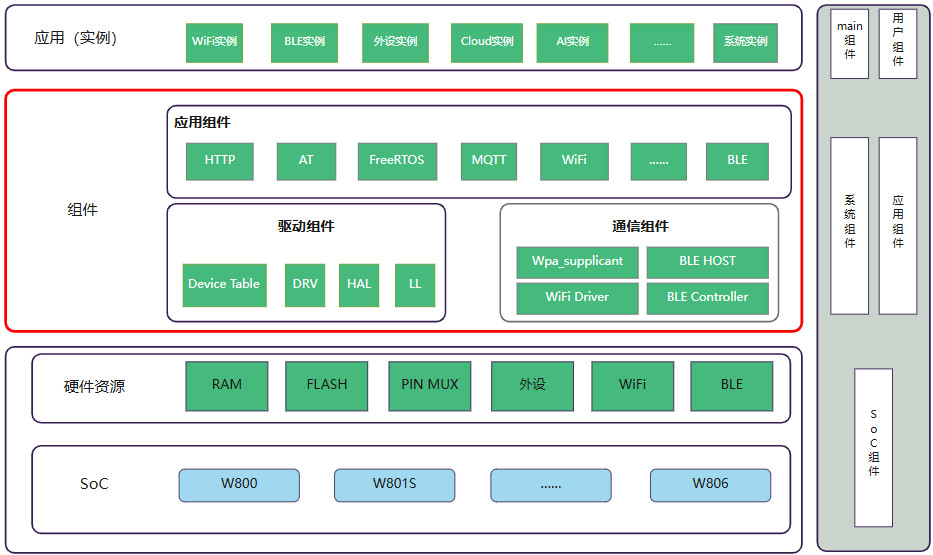
这里我们使用 W803-Pico 开发板驱动 TFT 显示屏,因此 SoC 选择 W803,组件 - 外设驱动 - TFT LCD - st7735_spi ;
在相应的文件路径下打开例程 wm_iot_sdk/examples/peripheral/tft_lcd/tft_lcd_dma ,右键 menuconfig 配置 SoC (W803)和 LCD Device (st7735_spi);
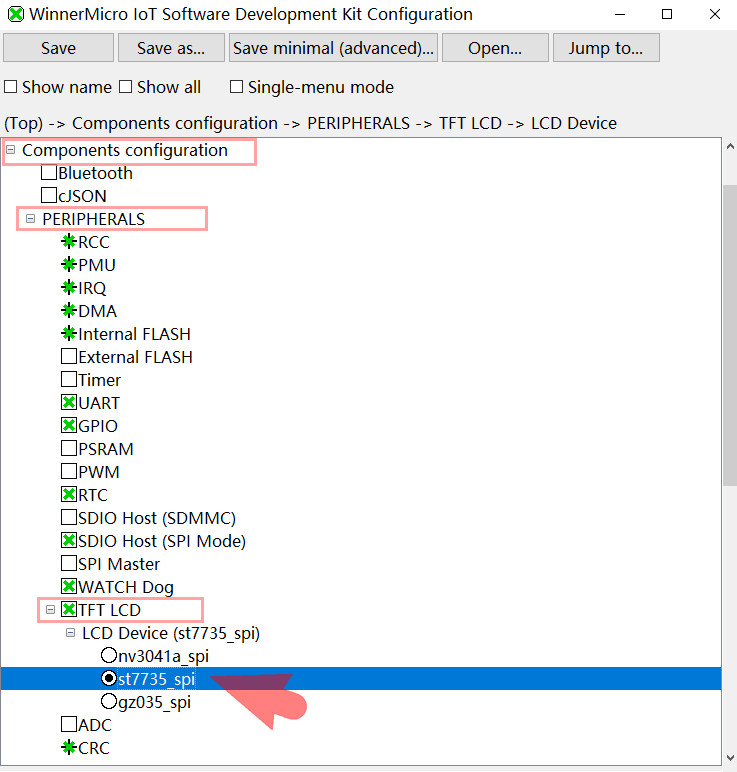
右键 build 构建工程,点击 flash 并选择开发板串口对应的端口号,实现固件上传。
代码
#include <stdio.h>
#include "wmsdk_config.h"
#include "freertos/FreeRTOS.h"
#include "freertos/task.h"
#include "freertos/semphr.h"
#include "wm_drv_tft_lcd.h"
#include "wm_drv_sdh_spi.h"
#include "picture.h"
#include "wm_utils.h"
#define LOG_TAG "lcd_example"
#include "wm_log.h"
static void wm_lcd_demo(void *arg)
{
int ret = WM_ERR_FAILED;
int id = 0;
wm_device_t *dev = NULL;
image_attr_t img = { 0 };
uint8_t *app_buf = NULL;
uint32_t block_size = 0;
uint16_t width = 0, high = 0;
wm_lcd_capabilitys_t cap = { 0 };
lcd_demo_sem = xSemaphoreCreateCounting(1, 1);
/*TODO: add more initial methods for other interfaces(like RGB/MIPI...) in future on new chip*/
/*use sdio(spi mode) for lcd demo as it's support high speed */
dev = wm_drv_sdh_spi_init(LCD_SPI_CONTROLLER_DEVICE_NAME);
if (dev == NULL) {
wm_log_error("init sdspi fail.");
}
/* initial the lcd device, and use the same device name which defined in device table*/
dev = wm_drv_tft_lcd_init(LCD_DEVICE_NAME);
if (dev == NULL) {
wm_log_info("init lcd fail.");
}
/* turn on the backlight*/
ret = wm_drv_tft_lcd_set_backlight(dev, true);
if (ret != WM_ERR_SUCCESS) {
wm_log_info("lcd bl set fail.");
}
/* show LCD capability */
wm_drv_tft_lcd_get_capability(dev, &cap);
wm_log_info("LCD x_resolution = %d", cap.x_resolution);
wm_log_info("LCD y_resolution = %d", cap.y_resolution);
wm_log_info("LCD rotation = %d\n", cap.rotation);
//NOTE: when color mode change , the byte width could be adjusted too.
/* malloc an application buffer to refresh the screen*/
width = cap.x_resolution;
high = cap.y_resolution;
block_size = (LCD_DATA_DRAW_LINE_UNIT * width * WM_CFG_TFT_LCD_PIXEL_WIDTH);
wm_log_info("DEMO:block_size=%d", block_size);
app_buf = malloc(block_size);
if (app_buf == NULL) {
wm_log_error("mem err\n");
}
/* set image and the image width, height depend on selected LCD device */
#if CONFIG_COMPONENT_DRIVER_LCD_NV3041A_SPI
img.image_buf = image_bluesky_480x272;
img.image_width = 480;
img.image_high = 272;
#else
img.image_buf = gImage_pic_winner_micro_logo_93x93;
img.image_width = 93;
img.image_high = 93;
#endif
if (img.image_width > width || img.image_high > high) {
wm_log_error("image unmatch");
}
/* Registers a callback function that gets triggered after the transmission of a bitmap is complete */
ret = wm_drv_tft_lcd_register_tx_callback(dev, lcd_demo_tx_cb, NULL);
if (ret != WM_ERR_SUCCESS) {
wm_log_info("register tx callback error(%d)", ret);
}
while (1) {
/* demo scenario 1 - show blue screen by dma*/
wm_log_info("wm_lcd_demo show blue background");
ret = lcd_demo_clean_screen_with_dma(dev, app_buf, block_size, LCD_RGB565_BLUE);
if (ret != WM_ERR_SUCCESS) {
wm_log_info("wm_lcd_demo_show_image ret=%d", ret);
}
vTaskDelay(pdMS_TO_TICKS(2000));
/* demo scenario 2 - rotation the image once lcd_demo_show_image() be invoked*/
if (id++ % 2) {
ret = wm_drv_tft_lcd_set_rotation(dev, LCD_ROTATION_NONE);
} else {
ret = wm_drv_tft_lcd_set_rotation(dev, LCD_ROTATION_180_DEGREE);
}
/* demo scenario 3 - show image by dma*/
wm_log_info("wm_lcd_demo show image(w=%d, h=%d)", img.image_width, img.image_high);
ret = lcd_demo_show_image_with_dma(dev, app_buf, block_size, img);
if (ret != WM_ERR_SUCCESS) {
wm_log_info("wm_lcd_demo_show_image ret=%d", ret);
}
vTaskDelay(pdMS_TO_TICKS(2000));
}
free(app_buf);
vSemaphoreDelete((QueueHandle_t)lcd_demo_sem);
vTaskDelete(NULL);
}
int main(void)
{
xTaskCreate(wm_lcd_demo, "wm_lcd_demo_task", WM_LCD_TFT_DEMO_TASK_STACK, NULL, WM_LCD_TFT_DEMO_TASK_PRIO, NULL);
return 0;
}效果
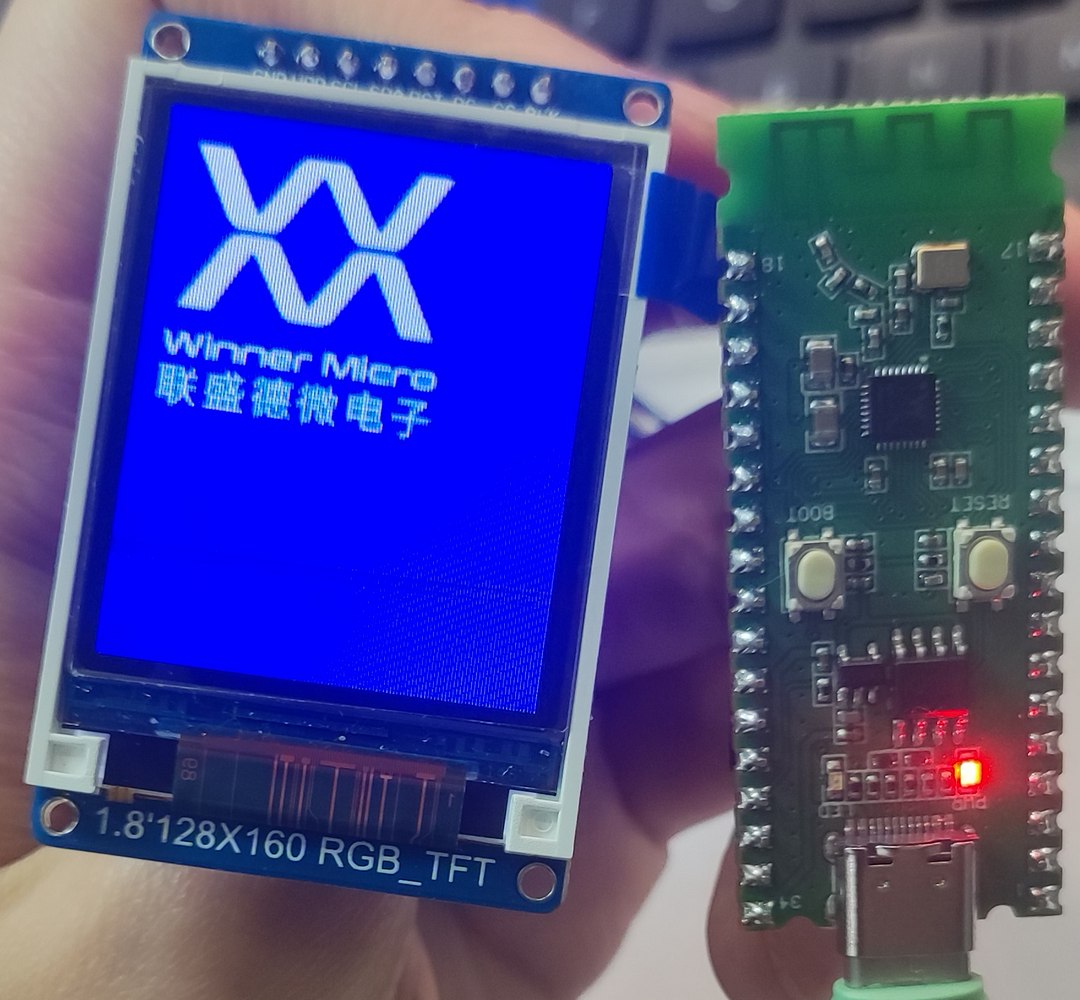
动态
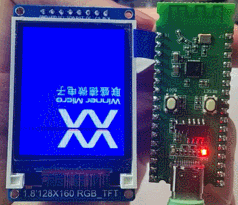
自定义图片
这里介绍修改工程,添加并实现自定义图片的 TFT 显示。
图片制作
这里使用 PowerPoint 绘制图文,另存为 BMP 格式图片;
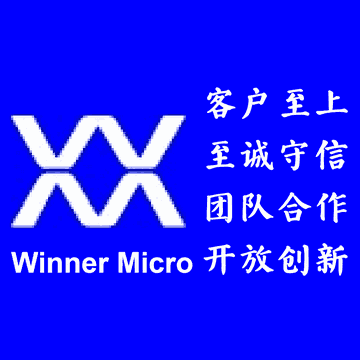
取模
打开 Image2LCD 软件,导入目标图片,配置相关参数(注意勾选 高位在前 选项),输出 .h 格式文件;
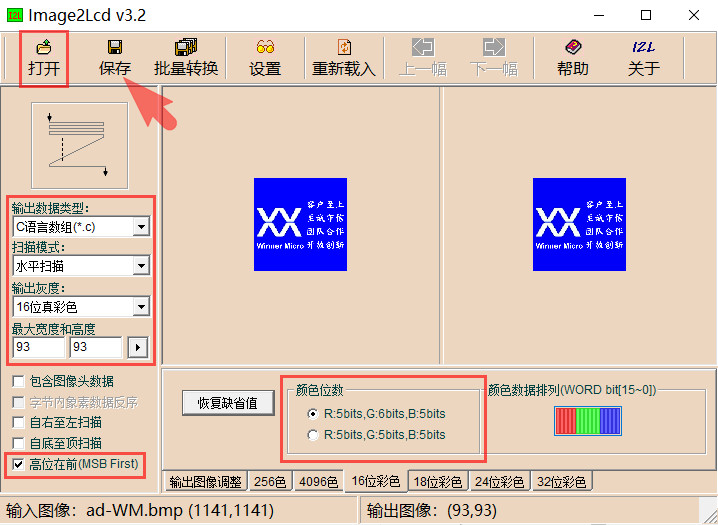
调试
将取模文件存放至主函数同一文件夹,在 picture.h 中增加取模文件 #include "pic_wm.h"
修改 void wm_lcd_demo 函数中关于图片数组的调用信息
img.image_buf = gImage_wm; // target picture array name
img.image_width = 93;
img.image_high = 93;保存文件,编译工程,上传固件。
效果
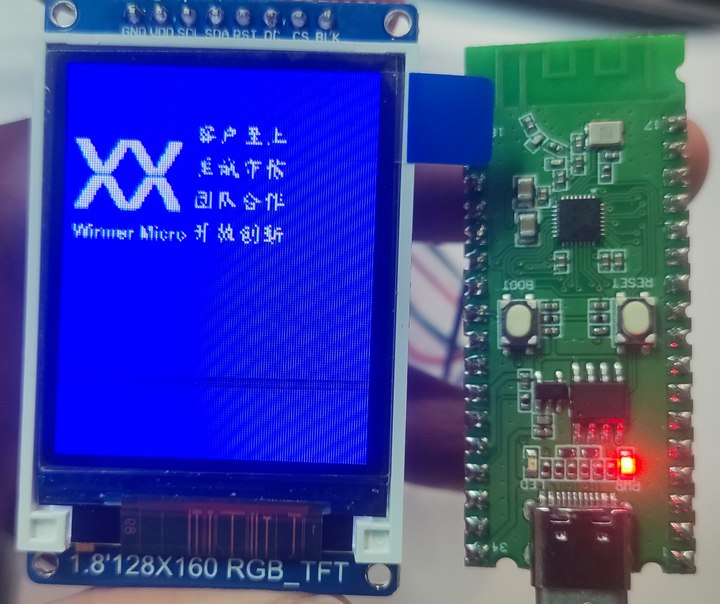
动态
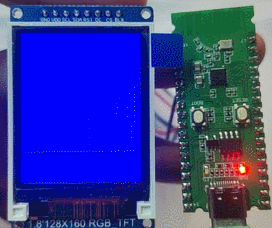
总结
本文介绍了联盛德 WM-IoT-SDK 2.X 工程 Demo 结合 W803-Pico 板实现 TFT 屏幕驱动的项目设计,包括原理介绍、硬件连接、工程测试、代码调试、自定义效果展示等,采用 DMA 硬件 SPI 驱动显示屏,刷新速度快、延迟低、显示质量佳,为相关驱动开发和显示屏的应用提供了参考。
